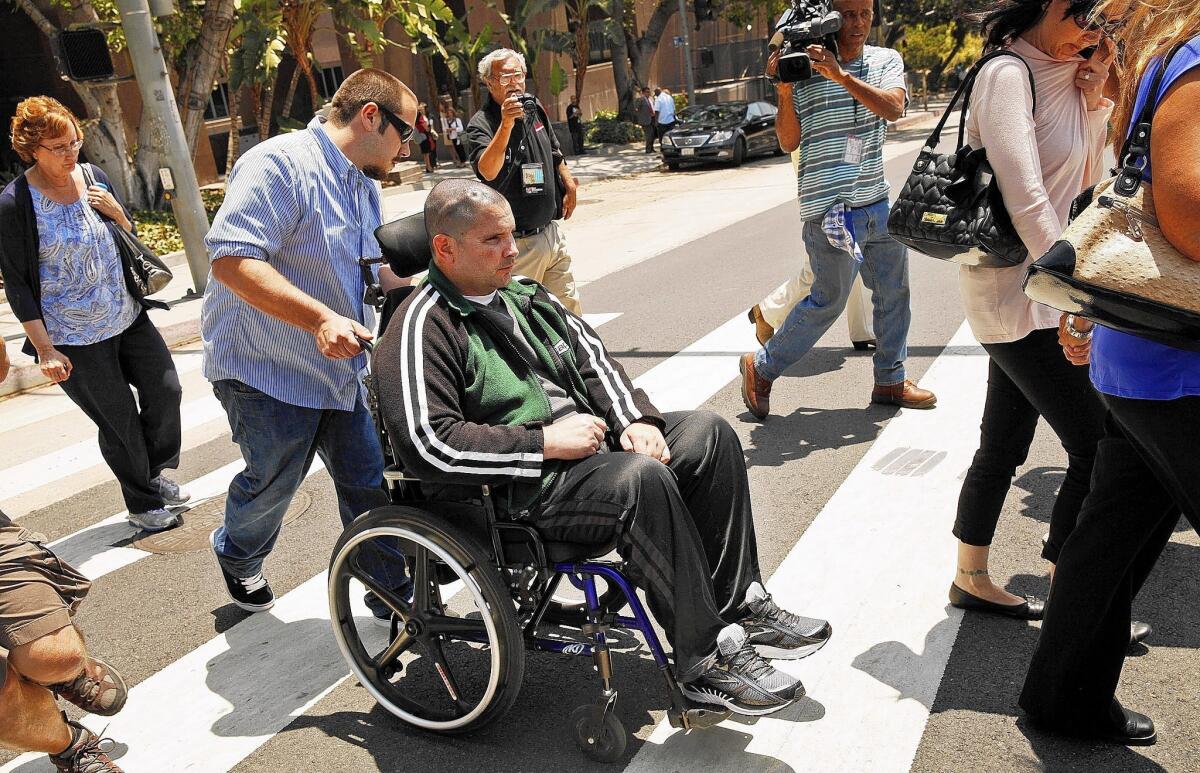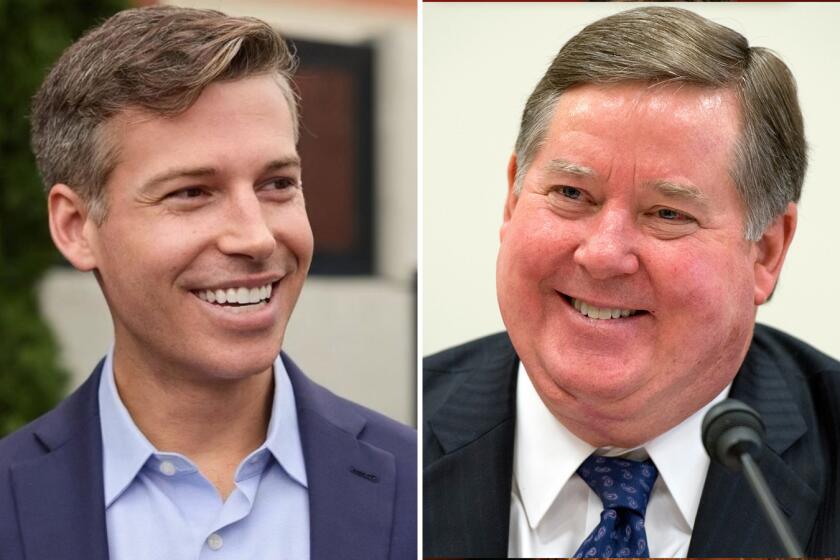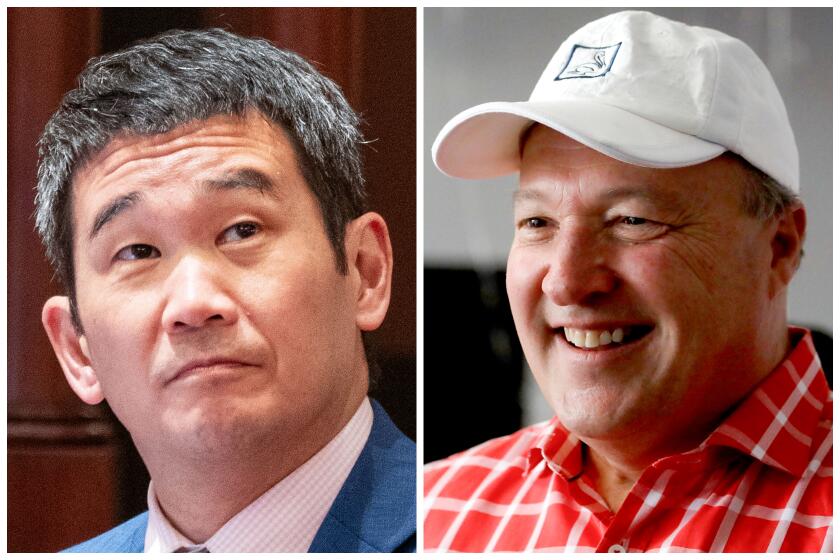Bryan Stow friend recalls ‘hostile’ atmosphere at Dodger Stadium

The men in orange and black would not go unnoticed at Dodger Stadium.
Alan “Jeff” Bradford, Matthew Lee, Corey Maciel and Bryan Stow had driven down from the Bay Area to watch their San Francisco Giants take on the Dodgers on opening day in 2011. As they waded through streams of blue and white, the decades-old rivalry between the teams was evident.
“It was pretty tense, pretty hostile, it was a lot of people on opening day so they were really packed in there on the way in,” Bradford, 29, testified Tuesday in a downtown Los Angeles courtroom. “There were some fans who were pretty outspoken.”
Bradford, a firefighter-paramedic, said hot dogs, popcorn and food packaging were thrown at them throughout the game.
“We made the mistake of sitting in the all-you-can-eat pavilion,” he said.
At one point, his group posed for a photo in their seats. Middle fingers unfurled in the background.
The day would end in extremes. Stow would be beaten unconscious in a parking lot by a pair of Dodger fans and police would fan out across the city, searching for the suspects. Rialto residents Louie Sanchez and Marvin Norwood later pleaded guilty to the attack.
Bradford, now a witness in a civil trial that accuses the Dodgers and former owner Frank McCourt of failing to provide adequate security, said he was unsure if the ushers who stood at the bottom of the stairs noticed the harassment from Dodgers fans during the game. He saw no security in their section.
The lawsuit filed on behalf of Stow and his two children alleges that a lack of security and insufficient lighting created the environment that led to the assault.
A former Dodgers security guard also testified Tuesday that he had been concerned about the stadium’s tactical plan when it came to massive crowds.
“You have a time lapse of 20 to 30 minutes of 56,000 people leaving a facility and force security personnel to obtain their equipment, change their radio frequencies, get in their golf carts and redeploy — you have lost a tactical advantage over anything that could possibly happen in that parking lot or any venue,” Neill Murchison said.
Murchison, a retired Los Angeles County Sheriff’s Department sergeant who began working for the Dodgers in April 2010, said he had been a SWAT team member during the 1984 Olympics and the 1994 FIFA World Cup. He said he had informed his Dodgers supervisor that he believed the stadium had a growing gang problem and was worried about the dim lighting in the parking lots.
“It was a hazard for the people that were exiting this facility,” Murchison said.
When pressed to recall an earlier deposition in which he described the atmosphere on opening day as “full of joy,” Murchison replied that his attention was limited to his assignment that night on the personal security detail for McCourt.
Flustered at times on the stand, Murchison stood his ground when it came to the Dodgers’ alleged negligence in Stow’s beating.
“These plans by this organization … did not adequately protect those individuals in that parking lot at that specific time,” he said.
An attorney for the Dodgers attempted to demonstrate that Stow’s group was not without blame. Dana Fox walked Bradford through his day in L.A., including drinking beer at a hotel before the game and stopping to take a photo under a sign that read, “Welcome to Dodger Stadium.”
“At this point you’re certainly feeling the effects of that alcohol, aren’t you?” Fox asked Bradford, who can be seen flipping off the Dodger sign in the photo.
“Yes, sir.”
Bradford testified that he and Stow each had about three or four beers during the game and were inebriated toward the end. At one point, Bradford said, Stow commented that he’d “rather eat his own feces than eat a Dodger dog,” infuriating a nearby fan who cursed at them.
Bradford said the group first encountered Sanchez after the game just outside the stadium. He said he saw Sanchez strike Lee, a member of their group, on the cheek. Bradford said Lee did not retaliate and the friends moved on, anxious to leave the area and find a cab.
After walking for about five minutes toward the edge of the parking lot, Bradford said the overhead lights became faint and he heard someone running behind him.
“I went to go turn to my right to see what it was and I got sucker-punched right in the chin,” he said. “It took me back over and onto my backside on the pavement.”
Bradford said he then saw Stow falling to the ground. “It appeared to me like he was already unconscious, he didn’t break his fall at all. He just went right back onto the pavement.”
Stow was unresponsive and his breathing was irregular. Blood dripped from his ears.
A former paramedic, Stow, 45, is now disabled with cognitive and physical limitations. He lives with his parents in Capitola, Calif.
His attorneys maintain that their client requires 24-hour care and have estimated that the cost of his past and future care at about $38 million. The defense has attempted to prove that Stow’s needs would cost far less, should the jury ever need to determine damages.
Erin Collins, 38, testified Tuesday that she visits her brother several times a week to help him shower, go to the bathroom and move between his wheelchair and his bed. At 270 pounds, Stow is difficult for his parents to handle alone, she said.
Collins described her brother as the life of the party who had worked hard to take care of his children, Tyler and Tabitha.
She spoke about Stow’s capabilities in the past tense, correcting herself when she slipped.
“We always talked about how funny he is — funny he was.”
More to Read
Sign up for Essential California
The most important California stories and recommendations in your inbox every morning.
You may occasionally receive promotional content from the Los Angeles Times.











